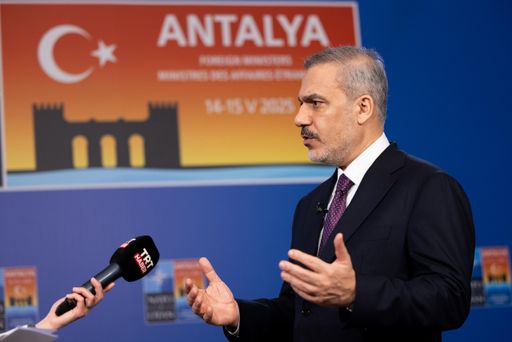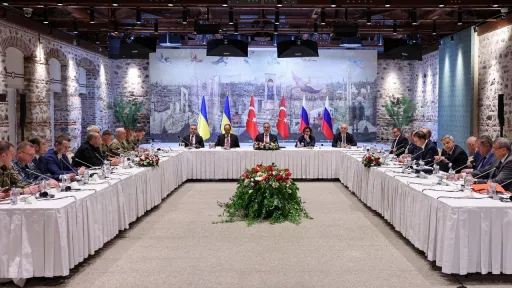Turkish President Recep Tayyip Erdogan has urged the EU to update the Customs Union and revise Schengen visa practices to boost economic and social mobility.
Speaking at the 6th European Political Community (EPC) Summit in the Albanian capital Tirana on Friday, Erdogan emphasised that "the visa practices such as Schengen, which limit the mobility of our citizens and, consequently, the circulation of goods, services, and capital, must be re-evaluated."
He said Türkiye believes that "updating our Customs Union with the EU will contribute to the security of supply chains." Erdogan emphasised that the Customs Union should be modernised to better reflect current trade realities and mutual interests.
He added that the ongoing restrictions not only hinder citizens' movement but also negatively affect commercial ties and broader economic integration with Europe.
"As a European continent, we must start transformation at home based on principles of indivisible security, fairer distribution of prosperity," he noted.
"As we discuss the future of Europe’s security at this critical time, we find the EU's efforts to develop its defence industry beneficial," he also stressed.
He underscored that European security cannot be solely dependent on external actors, and that the continent must accept collective responsibility for its peace and stability. -
Netanyahu’s aggressive policies in Gaza slammed
Erdogan also urged European countries to show the necessary willingness and interest in helping establish a ceasefire in Gaza. He warned that Israeli Prime Minister Benjamin Netanyahu's aggressive and uncompromising policies endanger the lives of people of all faiths in Gaza and throughout the region.

"Over 2 million people in Gaza have been condemned to hunger, and the international community's silence in the face of this tragedy is incompatible with human dignity," he said.
He emphasised the importance of immediate and sustained humanitarian aid deliveries, as well as the need to rebuild Gaza to make it livable again.
"Our main objective must be to implement a two-state solution as the only viable and sustainable path to peace," Erdogan added.
The Israeli army has pursued a brutal offensive in Gaza since October 7, 2023, killing some 53,000 Palestinians so far, most of them women and children.
The International Criminal Court issued arrest warrants last November for Israeli Prime Minister Benjamin Netanyahu and his former Defence Minister Yoav Gallant for war crimes and crimes against humanity in Gaza.
Israel also faces a genocide case at the International Court of Justice for its war on the enclave.
Istanbul peace talks
Regarding the war in Ukraine, Erdogan emphasised that encouraging both Russia and Ukraine without imposing conditions, given the sensitivity of the process, is key to achieving a just and lasting peace.
He said recent talks with world leaders such as Donald Trump, Vladimir Putin, and Volodymyr Zelenskyy have provided an important opportunity to end hostilities.
Responding to a question from reporters about Russia-Ukraine peace negotiations, Erdogan said: “Together with my brother (Albanian Prime Minister Edi Rama), we will call for peace to the whole world from Albania.”

"We believe that the opportunity before us must not be squandered. Dialogue channels between Ukraine and Russia must remain open," he said. Erdogan was welcomed by Rama at the entrance to Skanderbeg Square, where the summit was hosted.
Turkish-German leaders discuss bilateral ties, global issues
The Turkish President also met with the German Chancellor on the sidelines of the EPC summit to discuss bilateral relations as well as regional and global developments.
According to the Türkiye Directorate of Communications, Erdogan said during the meeting that Türkiye and Germany have deep-rooted and multidimensional relations and that the two countries will work to advance their cooperation in the coming period.
Erdogan further said that Türkiye will persist in its utmost effort to ensure that the ongoing Ukrainian war ends with fair and lasting peace and that efforts for peace should be increased, not letting the window of opportunity be missed.
The Turkish leader also invited Friedrich Merz to Türkiye, and the German chancellor agreed to visit as soon as possible.
Europe must reclaim its visionary ideals, with Türkiye by its side: Albanian PM
Meanwhile, Albanian Prime Minister Edi Rama said for the visionaries of the European project, “Türkiye would’ve been an indispensable partner in any union of perpetual peace” – but that project “failed.”
Drawing on Enlightenment thought and European political history, Rama cited one of the earliest proposals for a united Europe: an 18th-century plan by the French diplomat and philosopher Abbe de Saint-Pierre.
After the War of the Spanish Succession and the 1713 Treaty of Utrecht, Saint-Pierre envisioned a federation of European states – a “Union of Perpetual Peace” that would render war obsolete.
"His project even included cooperation with Russia, as well as with the Balkan and Mediterranean states then under Ottoman rule," said Rama.
“So I guess that for the visionary Abbe, today’s Türkiye would also be an indispensable partner in a union of perpetual peace.” But that project "failed," he added.
Rama’s rhetorical turn toward Enlightenment values – invoking not only Saint-Pierre but also Voltaire and Kant – added depth to his argument. He lamented that the original peace project was "killed by light interests and petty caprice," and warned that Europe today risks falling into a similar trap.
"Even today, the myth of Europa persists, and the resemblance to the Europe gathered here today is striking. The dream of perpetual peace has been replaced by the nightmare of perpetual war."
“Here in the Balkans, we have survived war, bombs, territorial conflicts, destruction and disruption,” he said. “It’s happened in our lifetimes, not in some distant black and white documentary archive, and we have learned that peace has no competitors.”
The speech offered a contrast between two Europes: one defined by militarisation and fear, and another rooted in enlightenment, human reason, and a belief in the humanity of one’s enemies, even historical ones.
“The enemies of peace should not drag us into the glorification of weapons,” he warned. “While we rightfully think about the Europe of resistance, defence and new military capabilities, we must not forget the other Europe – the Europe of enlightenment ... and the quest for perpetual peace, not just among ourselves, but even with our enemies.”















